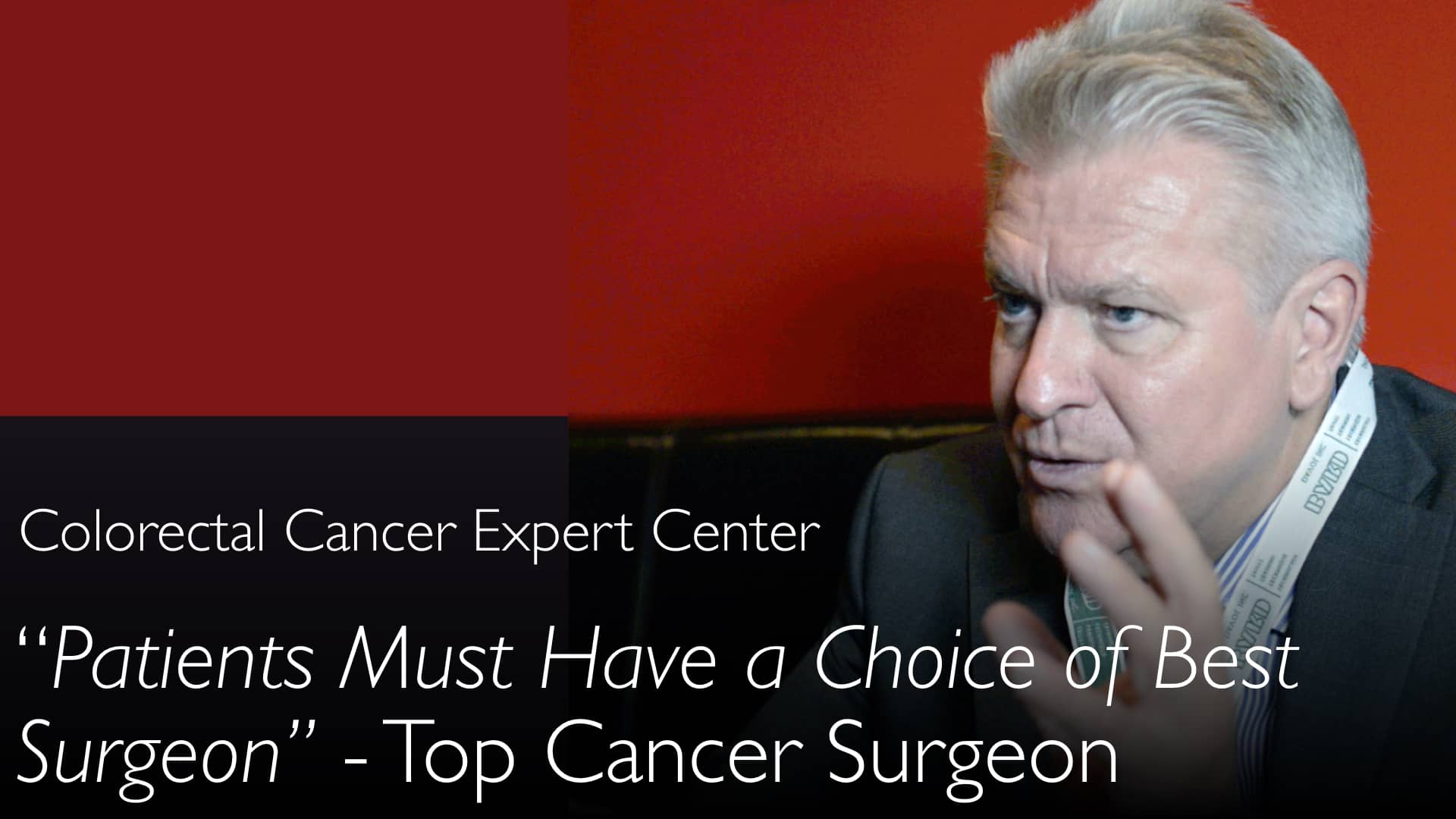מומחה מוביל בניתוחי סרטן החלחולת, ד"ר טורביורן הולם, MD, מסביר כיצד מיומנות המנתח היא הגורם הפרוגנוסטי החשוב ביותר להישרדות החולה, ומפרט מחקר קליני שוודי פורץ דרך שהוכיח את הצורך הן בהכשרה מיוחדת בכריתה מלאה של המזנטריום הרקטלי (TME) ובנפח ניתוחי גבוה – ביצוע מעל 15 ניתוחים בשנה – כדי להשיג את התוצאות הטובות ביותר בטיפול בסרטן החלחולת.
כיצד מיומנות המנתח ונפח הניתוחים משפיעים על תוצאות ניתוח סרטן החלחולת
קפיצה לפרק
- המנתח כגורם הפרוגנוסטי החשוב ביותר
- מחקר ההדרכה הקליני TME בשטוקהולם
- מנתחים בעלי נפח גבוה לעומת נפח נמוך
- שילוב הכשרה ונפח ניתוחי
- השלכות לבחירת מנתח
- תפקיד חוות הדעת הרפואית השנייה
המנתח כגורם הפרוגנוסטי החשוב ביותר
מיומנותו הטכנית וניסיונו של מנתח הסרטן הם הגורמים הפרוגנוסטיים המשמעותיים ביותר בטיפול בסרטן החלחולת, אף יותר מסמנים מולקולריים או דירוג TNM. ד"ר טורביורן הולם, MD, מנתח מעי גס וחלחולת מוביל, מדגיש כי יכולתו של מנתח לבצע ניתוח מדויק קובעת ישירות את הישרדות המטופל הכללית ואת שיעורי ההישנות המקומית. עיקרון זה מדגיש כי בחירת המנתח היא החלטה קריטית במסע הטיפול בסרטן.
ד"ר אנטון טיטוב, MD, המראיין, מציין שממצא זה עולה בקנה אחד עם מחקרי איכות ניתוחית בתחומי סרטן אחרים. מיומנות המנתח קובעת את הצלחת תכנית הטיפול הרב-מודאלית המלאה לסרטן החלחולת.
מחקר ההדרכה הקליני TME בשטוקהולם
ד"ר טורביורן הולם, MD, היה שותף לכתיבת מחקר קליני מכונן בשטוקהולם שהחל בשנת 1994. המחקר החל עם פרופ' ביל הילד מאנגליה, חלוץ בהוראת טכניקת הכריתה המזורקטלית המלאה (Total Mesorectal Excision, TME). שיטה זו כוללת הסרה של החלחולת יחד עם מעטפת הרקמה הסובבת (המזורקטום) כחתיכה אחת שלמה, דבר הקריטי להפחתת הישנות הסרטן.
המחקר העריך את כל חולי סרטן החלחולת שעברו ניתוח בין 1995 ל-1997. המנתחים חולקו לקבוצות לפי השתתפותם בקורסי ההדרכה המיוחדים ל-TME. הרישום השבדי המפורט לסרטן החלחולת סיפק את הנתונים הדרושים כדי לקשר ישירות בין הכשרה ניתוחית לתוצאות המטופלים.
מנתחים בעלי נפח גבוה לעומת נפח נמוך
המחקר הקליני הגדיר מנתח "בעל נפח גבוה" בסרטן החלחולת כזה המבצע יותר מ-15 ניתוחים בשנה. התוצאות היו מדהימות. מנתחים שהיו גם בעלי נפח גבוה וגם השתתפו בהדרכת TME השיגו תוצאות טובות משמעותית. הם השיגו שליטה מקומית ושיעורי הישרדות מעולים עבור מטופליהם.
התוצאות הגרועות ביותר נראו במטופלים שעברו ניתוח על ידי מנתחים בעלי נפח נמוך שלא קיבלו הכשרה מיוחדת ב-TME. קבוצה זו ביצעה פחות מ-15 ניתוחים בשנה וחסרה את ההכשרה הפורמלית, מה שהוביל לשיעורי הישנות גבוהים יותר. מבין חמשת המנתחים בעלי הנפח הגבוה בשטוקהולם, כמה שהרבו ביותר לבצע ניתוחים השיגו את התוצאות המוחלטות הטובות ביותר.
שילוב הכשרה ונפח ניתוחי
ד"ר טורביורן הולם, MD, מדגיש שניסיון ניתוחי בלבד אינו תחליף להכשרה נאותה בטכניקות הטובות ביותר. מנתח יכול לבצע ניתוחים רבים, אך אם אינו משתמש בשיטה האופטימלית והמבוססת-ראיות כמו TME, תוצאות המטופלים לא יהיו אידיאליות. ההיפך גם נכון; מנתח שהוכשר ב-TME חייב לבצע את ההליך בתדירות גבוהה כדי לשמר ולשפר את מיומנותו.
המפתח לתוצאות הניתוח הטובות ביותר לסרטן החלחולת הוא השילוב בין הכשרה מיוחדת ונפח תרגול גבוה. דרישה כפולה זו מבטיחה שהמנתח לא רק בעל ידע, אלא גם מיומן טכנית ומסוגל להתאים עצמו לאנטומיה הייחודית של כל מטופל.
השלכות לבחירת מנתח
עבור מטופל המחפש את הטיפול הטוב ביותר בסרטן החלחולת, מחקר זה מספק מסגרת ברורה. חיוני למצוא מנתח שהוכשר specifically בטכניקות מתקדמות כמו כריתה מזורקטלית מלאה, ומבצע ניתוחי סרטן החלחולת בתדירות גבוהה. מטופלים צריכים להרגיש מועצמים לשאול מנתח פוטנציאלי על הכשרתו הספציפית בניתוחי סרטן החלחולת ועל נפח המקרים השנתי שלו.
ד"ר אנטון טיטוב, MD, מדגיש שמנתח חייב גם להיות גמיש דיו כדי להתאים אישית את גישתו הניתוחית למצבו האינדיבידואלי של המטופל. מיומנות והיכולת להתאים את הניתוח הם סימנים היכר של מנתח סרטן החלחולת מומחה.
תפקיד חוות הדעת הרפואית השנייה
קבלת חוות דעת רפואית שנייה היא שלב מומלץ מאוד לאישור אבחנת סרטן החלחולת ותכנית הטיפול. חוות דעת שנייה יכולה לאשר שהניתוח אכן נחוץ ושגישת הניתוח המוצעת היא סטנדרט הטיפול הנוכחי. היא גם מספקת הזדמנות להעריך את הכישורים, ההכשרה והניסיון של המנתח הנבחר מול אמות המידה שנקבעו על ידי מחקרים קליניים.
תהליך זה מבטיח שמטופל יכול להיות בטוח שהוא בוחר במרכז הטיפול הטוב ביותר לסרטן החלחולת ובמנתח הסרטן המוסמך ביותר לטיפולו, ובסופו של דבר ממקסם את סיכוייו לתוצאה מוצלחת.
תמליל מלא
ד"ר אנטון טיטוב, MD: המנתח הוא הגורם הפרוגנוסטי החשוב ביותר בטיפול בסרטן. מנתח סרטן החלחולת שבדי מוביל דן בטיפול הניתוחי בסרטן החלחולת. מנתחים חייבים לדעת כיצד לבצע את סוג הניתוח הנכון. ניסיון ניתוחי אינו תחליף להכשרה וידע בשיטת הטיפול הטובה ביותר.
מנתח סרטן חייב להיות מסוגל להתאים את טכניקת הניתוח שלו ולהתאים את היקף הניתוח למצב המטופל. האם מנתח הסרטן שלך competent וגמיש דיו כדי להתאים אישית את הניתוח עבורך?
ניתוח לסרטן החלחולת. מי הוא מנתח הסרטן הטוב ביותר? האם ניתוח הוא הטיפול הטוב ביותר לסרטן החלחולת? אפשרויות ניתוח לסרטן החלחולת. ניתוח סרטן החלחולת מתקדם. חוות דעת רפואית שנייה מאשרת שאבחנת סרטן החלחולת נכונה ומלאה. חוות דעת רפואית שנייה מאשרת גם שניתוח סרטן החלחולת נדרש.
הטיפול הטוב ביותר לסרטן החלחולת. חוות דעת רפואית שנייה מסייעת לבחור את הטיפול הטוב ביותר לסרטן החלחולת. קבל חוות דעת רפואית שנייה על סרטן החלחולת והיה בטוח שהטיפול שלך הוא הטוב ביותר. מרכז הטיפול הטוב ביותר לסרטן החלחולת ומנתח הסרטן.
ראיון וידאו עם מומחה מוביל בניתוחי טיפול בסרטן החלחולת ובטיפול מינימלי פולשני בסרטן החלחולת. מנתח סרטן מעי גס וחלחולת מוביל. אתה כתבת מחקר קליני מפורט מאוד: "מנתח הסרטן כגורם פרוגנוסטי בטיפול בסרטן החלחולת".
בטיפול בסרטן, מיומנות מנתח הסרטן היא הגורם החשוב ביותר לפרוגנוזה הטובה ביותר. ישנם מחקרים קליניים רבים הקובעים כיצד סמנים מולקולריים ודירוג TNM משפיעים על הטיפול בסרטן והפרוגנוזה. אך איכות ומיומנות מנתח הסרטן המוביל הם הגורם הפרוגנוסטי החשוב ביותר בהישרדות הכללית בסרטן.
האם תוכל בבקשה להגיב על מחקריך על איכות הניתוח? מה קובע את ניסיון מנתח הסרטן בטיפול בסרטן המעי הגס והחלחולת?
ד"ר טורביורן הולם, MD: החשיבות של מיומנות ואיכות מנתח הסרטן נחקרה extensively. ביצענו מחקר קליני בשטוקהולם. הערכנו מנתחי סרטן מעי גס וחלחולת שהשתתפו בפרויקטים חינוכיים.
ב-1994, התחלנו פרויקט עם מנתח סרטן מעי גס וחלחולת פרופ' ביל הילד מאנגליה. הוא לימד מנתחי מעי גס וחלחולת בשטוקהולם כיצד לבצע כריתה מזורקטלית מלאה (TME) טובה בחולי סרטן החלחולת. היו לנו מנתחי סרטן מעי גס וחלחולת שהשתתפו בקורסים אלה. היו לנו גם מנתחי סרטן מעי גס וחלחולת שלא השתתפו בקורסי הדרכה לניתוחי כריתה מזורקטלית מלאה.
יש לנו רישום סרטן החלחולת very good בשבדיה. מרישום סרטן החלחולת, יכולנו לראות אילו מנתחי סרטן החלחולת ניתחו אילו חולי סרטן החלחולת. זה היה כאשר ד"ר הילד לימד ניתוחי כריתה מזורקטלית מלאה לסרטן החלחולת בשטוקהולם.
אז הערכנו את כל החולים שעברו ניתוח לסרטן החלחולת בין 1995 ל-1997. יכולנו לראות שחולי סרטן החלחולת נותחו על ידי מנתחי מעי גס וחלחולת שהשתתפו בקורסים. ראינו גם שחולים נותחו על ידי מנתחי סרטן החלחולת בעלי נפח גבוה.
הגדרנו "נפח גבוה" כמנתחי סרטן החלחולת המבצעים יותר מ-15 ניתוחים בשנה. אז היו שתי קבוצות: מנתחי סרטן החלחולת שהשתתפו בקורסי הדרכה לכריתה מזורקטלית מלאה ומנתחי סרטן החלחולת שלא השתתפו. היו גם מנתחי סרטן החלחולת בעלי נפח גבוה ומנתחי סרטן החלחולת בעלי נפח נמוך שביצעו פחות מ-15 ניתוחי סרטן החלחולת בשנה.
חמישים אחוז מכלל חולי סרטן החלחולת נותחו על ידי מנתחים בעלי נפח גבוה. מנתחי סרטן החלחולת אלה השתתפו בקורסי הדרכה לכריתה מזורקטלית מלאה.
מנתחי סרטן החלחולת בעלי נפח גבוה שהשתתפו בהדרכת TME השיגו תוצאות טובות significantly ממנתחים שהיו בקורסים אך ביצעו פחות מ-15 ניתוחי סרטן החלחולת בשנה. התוצאות הגרועות ביותר של טיפול ניתוחי בסרטן החלחולת היו על ידי those מנתחי מעי גס וחלחולת שלא השתתפו בקורס ההדרכה לכריתה מזורקטלית מלאה והיו בעלי ניסיון ניתוחי נפח נמוך לסרטן החלחולת.
ד"ר אנטון טיטוב, MD: תוצאות איכות ניתוחי סרטן החלחולת אלה correlate עם מחקרי איכות ניתוחית בתחומים אחרים. המחקר הקליני שלך גם הראה ששניים או שלושה מנתחי סרטן החלחולת היו עם המספר הגבוה ביותר של מקרי ניתוח סרטן החלחולת. הם השיגו את התוצאות הטובות ביותר among all מנתחי סרטן החלחולת





